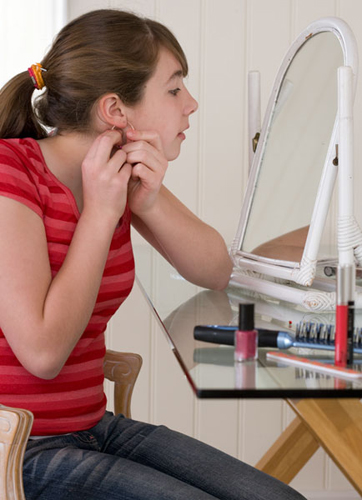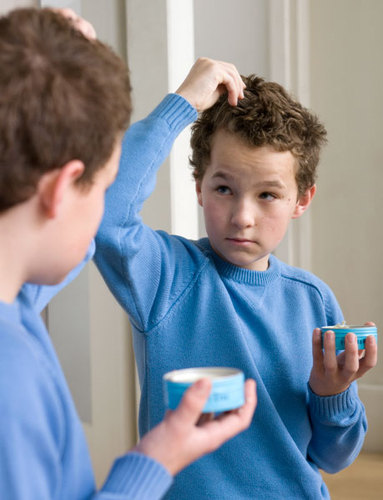| Q: |
I think that my daughter’s friends are a bad influence. Can I forbid her from seeing them?
|
| A: |
Banning something usually makes it more attractive. Trying to ban
friends is practically difficult and may well mean that the friendship
becomes clandestine, making it deliciously exciting. The subterfuge will
only distance your daughter from you further. It might be worthwhile to
discuss with your daughter what she likes so much about these friends.
They are satisfying a need in your child that may be satisfied in some
other way. It could be that she feels safe and grown-up with these
“unsuitable” young people, and you could address her insecurities
together.
If they are
influencing her to behave in risky, unacceptable, or antisocial ways,
you would be right to try and discourage her from mixing with them.
Explain your reasons for your concerns, and ask her to cooperate in
trying to see less of them. Support her to make connections with more
suitable friends.
|
| Q: |
How can I teach my materialistic son the value of money?
|
| A: |
Preteens are a lucrative market, but at this age they are not yet
cynical enough to realize that they are being targeted with subtle
advertising. Brand names and the latest gizmos are signs of status that
can mean a great deal within his peer group: The boy with the latest
cell phone or MP3 player is top dog. They are probably at their most
rapacious at this age, wanting possessions without any real
understanding of their value or the hard work behind the money that pays
for them. Encourage your son to earn some of the money toward
purchasing these products. This might be doing some jobs for neighbors
and extended family, and it certainly can apply to jobs he does at home.
Pay him to clean the car or mow the lawn and encourage him to save his
money for the things he wants. You can agree to match his savings to get
the new game or pair of shoes. Also, consider with him how important
possessions are in his judgments of his friends. Is it really all about
the things they own, or is it more about their great sense of adventure
or their hilarious jokes? Don’t be afraid to say no to his constant
demands, or to make him wait for a new possession: If he really wants
it, he will value it all the more. If you give in every time, he will
not learn the value of money.
|
| Q: |
For my daughter’s 12th birthday she wants to have a sleepover. Is this a good idea?
|
| A: |
There are lots of advantages to having a slumber party at this
age: You know where the kids are, you are on hand if you are needed, and
you can keep an eye on them while giving them time on their own. It is
also a good opportunity for your daughter to learn about being a good
host. Give her the responsibility of planning and organizing the party
with your help and support. In order to preempt difficulties, set a
limit to the number of guests she can have over. (Even numbers of guests
are probably best.) Have some activities planned, such as a DVD, games,
and make-your-own pizzas or ice-cream sundaes, and then leave them to
their own devices. You may be called upon to deal with someone who is
homesick or just plain sick—both are very likely. Talk about the ground
rules with your daughter beforehand, and think about how you will
communicate them to her guests. You might decide to show them around the
house at the beginning, introducing them to the whole family and
pointing out which rooms are out of bounds. You may want to restrict
certain television shows and give them a time when things need to quiet
down. They probably won’t sleep much, but will definitely have lots of
fun.
|
| Q: |
My daughter says she is fat and ugly, and it’s my fault she’s like that. What can I do?
|
| A: |
This can be a time when youngsters seem to be beset with
self-doubt, and you may observe this as a drop in self-esteem. This can
be coupled with the development of a more curvy figure as puberty
progresses, which may be quite a change from her previous childish shape
and lead her to feel fat. However, she is still a child in many ways
and is struggling to rationalize her emotional turmoil—hence the finger
of blame being pointed at you. Try not to take this personally. Instead,
take a deep breath and help her sort out what is real and what is
distorted thinking. Help her to realize that she doesn’t always feel fat
and ugly, even from one day (or hour) to the next. It’s not that her
body and face change dramatically, just the way she is thinking and
feeling about it. Help her experiment with hairstyles, colors, and
styles of clothes that make her feel better and, most importantly, get
her busy doing things that help her to feel good in her skin. Physical
activity may help; it produces endorphins, which have their own positive
payoff for self-esteem and self-image.
|
| Q: |
My son and I are always arguing. Is there a way to defuse these shouting matches?
|
| A: |
Arguments between you and your preteen may become more common as
he challenges your authority on clothes, allowances, curfews, and the
like. It is worth remembering to be patient, keep calm, and to hear his
point of view. Get him to think through the advantages and disadvantages
of his request and come up with a balanced decision about whether to
proceed with it. If it is safe, then sometimes learning through his own
mistakes is the most effective lesson of all.
Try to stay positive,
and avoid using guilt and emotional blackmail. It is more effective to
say, “I felt put down by the way you talked to me in front of your
friends,” rather than, “You were rude to me in front of your friends.”
The former explains the impact of his behavior and may get him to think
about it, while the latter is an accusation—he is more likely to become
defensive. There will be times when he pushes the boundaries just to
test you, so do not be afraid to say “No.” He will be relieved to have
you stand firm.
|
| Q: |
My son used to be very level headed, but now his behavior is so up and down. What’s going on?
|
| A: |
Development for any child is a slowly unfolding process. As your
son’s thinking and reasoning skills become more complex, you will see a
steady increase in the mature, age-appropriate behavior you want to
reinforce, mixed in with flashes of what you might expect from a younger
child. You can help him with this process by not being critical of his
fluctuating behavior, ignoring any silly or immature behavior as much as
possible, and encouraging his developing skills by praising and
reinforcing examples of the behavior you want to see more of. Try to
role model behavior that you’d like to see, such as good manners. Your
son is still young, though, so you should expect him to act without
thinking at times—that’s part of the fun of being a child.
|
| Q: |
My child shows absolutely no signs of growing up. Will he be left behind by his peer group?
|
| A: |
Late-middle childhood is not a developmental stage, like
adolescence, but a period of social and educational change. Many
children, particularly boys, do not go through puberty until well into
their teens, and remain looking and behaving like children while their
peers develop and change around them. It can be difficult to be the only
one who shows no sign of physical development but, if he is happy with
his friends and in his activities, there is nothing to worry about. Boys
often get very involved in particular activities during this preteen
stage, such as sports or chess club or war games, and seem oblivious to
the world of girls and pop culture. Let him enjoy his childhood; he will
catch up in due course.
|
Making time to talk Transferring values
Since my children
were small, I always insisted that we eat our evening meal together as a
family. Whatever they are doing in the evening we sit down at the table
together. Now that they are older and spending more time with their
friends, I still try to ensure that we eat together on weeknights. This
is our opportunity to talk, and it is so normal that they always do.
Now that we are heading
for adolescence, our conversations move backward and forward from
football and ballet to schoolwork, friends, music, smoking, Grandad’s
colorful youth, and the pros and cons of becoming a vegetarian. I can
talk about difficult issues without having to announce a lecture and
immediately lose their attention. It means that our parental and family
values are filtering down to our children in an organic way, which just
might ensure that they hear and remember them when having to make
difficult choices.
Arguments with your preteen
Your daughter has
you cornered. She wants to dye her hair black for her last day at
elementary school and you have said, “No! Absolutely not.”
She starts to plead with you, saying that everyone else is doing
something: So and so is having braids and beads put in, another is
having highlights. “Please,” she says, “It’s the last day I’ll ever be
at that school.” You start to doubt your decision; you don’t want your
child to have dyed black hair all over the summer vacation, but you
can’t come up with a reason that she will accept. You stand firm, she
cries with frustration, and storms from the room. You are left upset and
bewildered, wondering if there was a better way to deal with her!
Part of the challenge of
dealing with this age group is the unexpectedness of it all. It seems it
was only a few weeks ago that you were struggling to get her to brush
her hair at all. When faced with these dilemmas, try and give yourself
some time to think your position through. Perhaps ask for some details
about what she wants to do and what her friends are doing and say that
you’ll get back to her with your decision. Perhaps a chat with another
one of the parents might help you to understand what has been agreed.
You can then make up your mind about whether this is a battle worth
fighting or just a little harmless fun that will bring you together over
the sink with some rubber gloves and a bottle of hair dye.

NOTE
Being cool and hanging out with others who are widely considered to be cool can be a masterful disguise for mixed emotions
Parenting tweens The drive to be cool
School dances, girl and
boy bands, pierced ears and fake tattoos, makeup, short skirts,
high-heel shoes, boys, social networking… and she’s only 11! The
in-between years, when she’s not quite an adolescent but not really a
child, can be a wake-up call for the teen years to come. If you can get
it right at this stage, you may have a head start for later.
Particularly in girls,
puberty may start to bring about physical changes that make your
daughter look older than her years and older than she feels. For this
age group, developing maturity has an elasticity that can be confusing
and stressful. Being “cool” and hanging out with others who are widely
considered to be “cool” can be a masterful disguise for this internal
tug of war.
A new age
Looking like the pop
stars and celebrities that she admires, mixing with peers who share the
same interests, and doing things that older kids do, all serve to mark
the end of childhood and the dawning of adolescence for your child. This
means decisions about the suitability of the clothes she chooses and
the way she wants to look. It also means choices of friends with whom
she wants to mix. These can sometimes be unsuitable or older girls and
boys, especially if she has had an early puberty. Finally, her behavior
may start to change, with signs of challenges and difficulties such as
lying about her whereabouts or being caught shoplifting. You may see
these as the influence of the peer group, but they may be more a sign of
your daughter’s need to fit in. Try asking her what it is that she
likes about her new friends—you may discover that they give her
something, composure or quirkiness, that she feels she is lacking.
Together, you may consider how she can develop these traits for herself
without being totally led by others.
Different identities
The rapid growth
in her cognitive and emotional development has moved her from the
spontaneous busy-ness of childhood to the beginnings of the more
reflective self-absorption of adolescence. She will be trying out
different identities, and experimenting with looks, companions, and
behaviors. Her templates for all these different possible selves will be
strongly influenced by what she sees in magazines, on television, and
on the internet. She will want to look like her friends. The shops are
filled with “tween fashion”—downsized fashion and glamour in colors and
shapes meant for older, shapelier, girls. And into this swirl of
glittering developmental confusion, there emerges for the first time a
sneaking doubt in her mind: That you, her parent, may not know best and,
worst of all, may not be cool at all.
What’s acceptable?
While your son or
daughter may be relishing the prospect of growing independence, new
intimacies, lights, music, and action… you as her parent, may be feeling
that it is all too much too soon. How do you steer a steady course
through these first tensions of growing up while keeping in touch with
your own judgment and values? The bottom line for the tween parent must
be to remember that she is still a child underneath that first bra and
lip gloss. The shift in your parenting doesn’t need to be seismic, but
it should subtly recognize changes from within and without. Behind the
challenges to your authority and judgment are many doubts and
insecurities that need careful handling, not a sudden imposition of
military rule or a complete relaxation of family routine in the quest to
become a cool parent.
Being popular
Popularity and
physical attractiveness are likely to be two issues most bothering your
child. You can help her to think about what it means to be popular by
putting it in perspective. Think with her about other young people and
what makes them popular, consider whether these are admirable traits or
not. For example, is it material possessions or having the latest
gossip, or is it being funny or a trustworthy friend? Particularly in
boys, there is a relationship between popularity and aggression, because
aggressive boys are perceived by their peers as tough and cool. Allow
your child to decide whether this is the sort of popularity that she is
after. Popularity can be more valuable among a small group of good
friends, rather than a large group of superficial acquaintances.
Socially able children are more likely to come from families where there
are clear rules about appropriate and inappropriate behavior. So don’t
stop teaching your child right from wrong now that she is starting to
question you. Redouble your efforts, explain your reasons, and share a
little of your own experience at a similar age. By imposing some limits
on her appearance and behavior, you will help her to feel secure and
more confident about her choices.
Fashion victim?
When it comes to
choices about what to wear and how to look, take account of the enormous
pressure on girls and boys to dress in a certain way from the media and
from their peer group. Preteens are targeted just as much as their
older sisters and brothers. However, your daughter will still look to
you for advice and approval (and financing) of the clothes she wears.
Look through magazines together and talk about what suits her, think
about stylish (age-appropriate) role models, and help her to discover
her own style. It might be a good idea to set a few rules about what you
consider acceptable, such as: When she can have her ears pierced, how
much makeup is OK, whether it’s OK for her midriff to show, etc. Give
some thought to what kind of a role model you are yourself. It is worth
updating your knowledge and views about music, pop culture, and fashion.
You could try exploring fashion and style together. By being better
informed about the world your tween inhabits, you are more likely to
earn her respect, to ensure that she listens to what you have to say
and, ultimately, to keep her safe.
Appropriate?
Think about what age you will allow your child to get her ears pierced or wear makeup and set rules to help her feel safe.

Looking cool
The drive to be cool is very strong at this age, with his peers and the media influencing fashion and hair styles.

Staying up to date
Try reading magazines together with your tween to understand her world. In this way you can show your interest.
